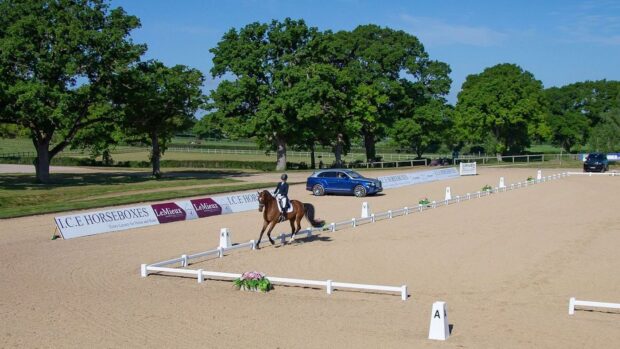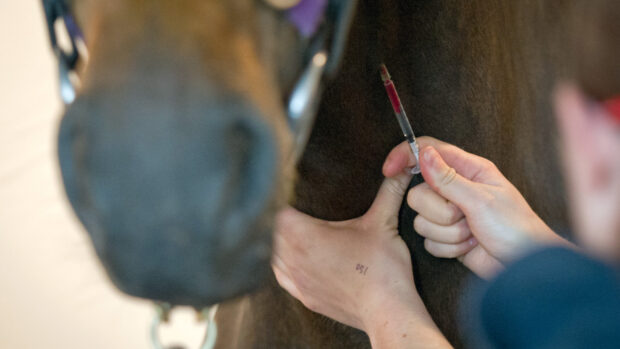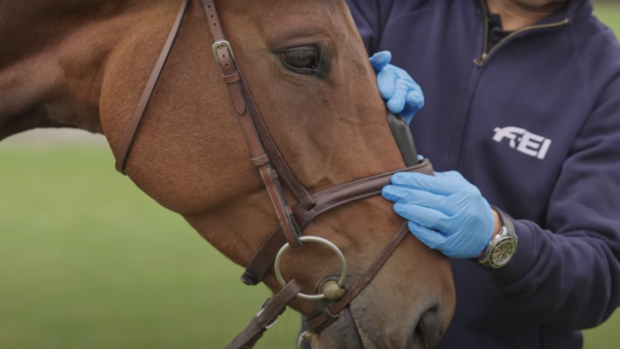An endurance rider and trainer has been given a record ban for three separate doping offences in a year – two while he was provisionally suspended.
The case of Saudi Arabian Rafae Alamri related to three anti-doping rule breaches in 2019. The case was heard by the FEI Tribunal and a decision was issued at the end of last month.
The first offence occurred at the CEI2* 120km at Al Ula, Saudi Arabia, on 2 February 2019. Blood samples taken from the horse Walfan, trained and ridden by Alamri, were found to contain reserpine, a tranquiliser with long-term sedation effects, and heptaminol, a stimulant that dilutes blood vessels, both of which are banned substances. The sample also contained controlled medication phenylbutazone and oxyphenbutazone, anti-inflammatory drugs with analgesic effects.
Alamri was provisionally suspended from all competition as of 4 March 2019, and Walfan was provisionally suspended from 4 March to 3 May 2019. On 19 March Alamri wrote to the FEI legal department with a “short explanation”, in which he apologised for the findings and claimed he was “not aware of the medicines” as pharmacies had given him the drugs, and he was “new to this type of competition”, as was Walfran.
The second offence related to Walfan at the CEI1* 110 at Al Qaseem, Saudi Arabia, on 9 March 2019, where the gelding tested positive for phenylbutazone and oxyphenbutazone. At the event Alamri was the registered trainer, and the rider was Ali Alhashem – but Alhashem and Walfan were prevented from competing as the horse was provisionally suspended. The FEI issued separate proceedings against Alhashem and on 6 October the FEI Tribunal sanctioned him to six months’ ineligibility.
The third case related to the CEI2* at 120 Al Ula, Saudi Arabia on 1 February 2020, where the horse Ankor Class, trained by Alamri and ridden by Alhashem, provided urine and blood samples which tested positive for phenylbutazone and oxybutazone. On 31 March Alamri was notified by the FEI that this third rule violation would be processed in a consolidated procedure with the first and second offences.
On 4 April the FEI received an email from the Saudi Arabian equestrian federation who confirmed they had contacted Alamri to notify him of the charges relating to Ankor Class. The federation “reminded him” he was provisionally suspended and not eligible to participate or attend in any capacity, including as a spectator, any event authorised or organised by the FEI or any national federation. He was also prohibited from training any FEI and/or national horses during his provisional suspension.
The federation told the FEI the Alamri stated he was not the trainer of Ankor Class. He alleged he did not attend the event and that his name was added by the horse’s owner in the entry system “in error”. As Alamri did not inform the federation of this before the event, he has accepted “any consequences” related to this error. Alamri did not submit any explanation in respect of the second or third doping offence.
In relation to the first offence the FEI submitted to the Tribunal that as Alamri did not dispute the presence of the substances or provide an explanation, the FEI had discharged its burden of establishing that Alamri had violated an anti-doping rule. With regard to the second and third offences, the FEI submitted Alamri did not dispute the presence of the samples, or respond to the FEI notification letters. Given this, the FEI maintained it had discharged the burden of establishing that Alamri had violated the rules.
In order to determine the applicable length of ineligibility, the FEI submitted the fault or negligence for each rule violation by Alamri must be evaluated – but as Alamri had failed to establish how the prohibited substances entered Walfan or Ankor Class it was not possible to evaluate the degree of level of fault or negligence based on the applicable rules. As a consequence, the FEI submitted that the presumption of fault, as stipulated in the rules, should stand for each violation.
Under anti-doping rules, if an aggravating circumstance is established by the FEI, the period of ineligibility can be increased up to a maximum of four years unless the person responsible can prove to the Tribunal that they did not knowingly commit the offence. The FEI outlined a number of aggravating circumstances; the sample in the first offence involved three different prohibited substances, no evidential explanation was provided, and the combination of the prohibited substances is uncommon and not normally associated with a legitimate medical treatment and may have been administered for intentional purposes. And given Alamri’s explanation in relation to the first offence that “the horse is new and I want to prepare him for the races” and the nature of the detected substances, the FEI concluded the products were intentionally administered, and as Alamri was also the trainer it was “impossible” to accept the claim that a “cocktail” of substances had been administered without his knowledge.
The FEI submitted that the rule violations took place within 12 months and Alamri was notified of each violation after each occurrence, so they should be considered as separate offences for the purposes of deciding an ineligibility period. The FEI explained to the Tribunal that the period should be examined in greater detail owing to the “unique elements” of the case; three violations have been consolidated, substantial delays occurred due to a backlog of cases the FEI legal department was dealing with, and although Alamri had not competed as a rider since 2 February 2019, he was a registered trainer on the FEI database. As such he violated the provisional suspension served on 4 March. The FEI “explicitly” removed Alamri from the database in 2019 following the second offence, but he was again registered by his national federation as a trainer in 2020 which was a “clear violation” of the rules.
Continued below…

Disappointment as ban overturned for rider of horse who suffered fatal fracture in competition *H&H Plus*

Ban for leading figure who falsified horses’ FEI passports

Subscribe to Horse & Hound magazine today – and enjoy unlimited website access all year round
When considering when a period of ineligibility should start, the FEI submitted Alamri “consciously and deliberately” violated his provisional suspension so he should not receive any credit for it. Consequently the FEI requested the ineligibility starts from the date of the Tribunal’s decision.
The Tribunal found the FEI had established the adverse analytical findings and sufficiently proven the violations of the rules and noted Alamri had failed to establish how prohibited substances entered Walfan and Ankor Class in all three cases.
After reviewing the sanctioning scenarios proposed by the FEI and with regard to aggravating factors, the Tribunal upheld the three charges. The Tribunal ruled Alamri should serve a ban of seven and a half years, and must pay a fine of 35,000 Swiss francs (£27,620) beginning on the Tribunal decision date – 24 June 2021. He must also pay the FEI’s 4,000 Swiss francs (£3,156) legal costs. Alamri may appeal the decision to the Court of Arbitration for Sport within 21 days of the notification.
Horse & Hound magazine, out every Thursday, is packed with all the latest news and reports, as well as interviews, specials, nostalgia, vet and training advice. Find how you can enjoy the magazine delivered to your door every week, plus options to upgrade to access our H&H Plus online service which brings you breaking news as it happens as well as other benefits.





